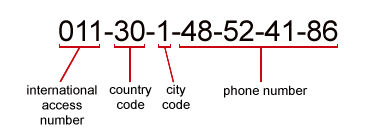Making international telephone calls is a lot easier than most people think. But there are a few important things to know about using the phone and making calls within (and to) foreign countries.
Foreign Phones
As you wander the globe, you will encounter a variety of different pay phones. Some phones require you to put a few coins in and then allow you to talk for as long as you like (like the ones here in Canada). Most phones, however, use coins or cards and limit the amount of time you can talk on the phone, depending on how much money you put into it. The more money you put in, the longer you can talk. One coin often allows you to make more than one phone call as well, or it will give you a certain amount of time to be on the phone before you have to add more money (or you get disconnected). This is how phone cards work. Each card has a pre-paid amount of money credited to it. As you talk on the phone, the credit is reduced until the card is empty, where it can then be thrown away or saved as a souvenir. Whether using coins or cards, most phones have a digital read-out that counts down, telling you how much time is remaining on the coin or card before more money is required.
Figuring Out International Phone Codes
Payphones themselves are relatively easy to figure out after a while. Its the multi-digit phone codes that usually confuse people and make international calls a frustrating process. But once you know the code, making international calls is easy. Look at the example below - a call from anywhere in Canada to Athens, Greece:
The international access number is the number that you need to punch in to allow you access to the international lines. Thus the name ‘access number’. The country you are IN is the access number you need to be able to call out. In the above example, Canada’s access number is 011. Once entered, you will be put on the international lines.
The country code is the code for the country you are calling to. For example, the code 30 is for Greece. No matter what country you are calling from, the country codes remain the same. View our complete listing of international country codes.
The city code is the code for the city you are calling to. In this case it’s 1, which is for Athens. Be aware that many cities in the world have the same code - its the country code that is different. For example, Paris, in France, has the same city code as Athens (1), but France’s country code is 33. For city codes, visit the ACR.
The rest is simply the phone number of the person or place you are trying to talk to in Athens, Greece. In a matter of seconds, you can be talking to someone on the other side of the world!
If you are calling home from Greece to Canada, the process is identical. However, now you want to use Greece’s international access number (which is 30), then Canada’s country code (1), then the area code of the city in Canada and finally, the phone number. Notice that each country’s access number and country code are different. Be patient when making international calls as you may have to wait up to 45 seconds before a connection is made.
Coins vs Phone Cards
After arriving in a city, if you plan on making some calls (ie. to a hostel to book your next reservation), your best bet is to purchase a phone card. Some pay phones don’t accept coins. As well, cards are much more convenient and are easier to use. Get them from vending machines, smoke shops and other small stores. In Japan, phone cards are sold everywhere, including vending machines, and come in a variety of denominations.
